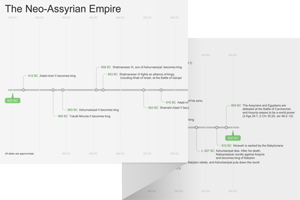15:1 The narrative once again shifts chronologically back in time; the focus shifts from the nation of Israel to the nation of Judah, picking up the narrative begun in 14:21–22. |
Azariah Also called Uzziah, king of Judah (vv. 13; Isa 1:1; 6:1; Hos 1:1). He reigned circa 792–742 bc.
15:3 all that Amaziah his father had done Although both kings do what is right in the eyes of Yahweh, they fail to take down the high places where people make unsanctioned offerings (2 Kgs 14:3–4; compare 12:2–3).
15:4 the high places Unsanctioned places of worship.
15:5 infected with a skin disease The Hebrew word used here, tsara', can refer to various skin diseases (see note on Lev 13:1–59).
He lived in a separate house In accordance with ritual laws concerning skin disease (Lev 13:46). Since Azariah had to be isolated, his son, Jotham, governed the land during the final years of Azariah’s reign.
15:6 the events of the days of the kings of See note on 2 Kings 1:18.
15:7 slept with his ancestors See note on 8:24.
15:8–31 This section chronologically ventures back in time, to describe a period of unrest for Israel, as several kings—with the exception of Menahem (vv. 17–22)—are murdered by someone who takes over the throne. Their reigns are generally short, with six kings ruling within about 25 years. The passage highlights the kings’ wickedness and emphasizes the growing Assyrian threat. It concludes with the first Assyrian deportation of Israelites, which occurred around 734 bc (see v. 29 and note). |
15:9 the sins of Jeroboam Refers to idolatrous and syncretistic worship. See note on 3:3.
15:12 the word of Yahweh Yahweh made this promise to King Jehu of Israel because he eliminated the house of Ahab, king of Israel, and Baal worship (10:30)
15:13 Uzziah king of Judah An alternate name for Azariah, king of Judah (see note on v. 1).
Samaria Capital of the northern kingdom of Israel. See 1:3 and note.
15:14 Tirzah The previous capital of Israel, from the time of Jeroboam (1 Kgs 14:17) until Omri moved the capital to Samaria (16:23–24).
15:15 the events of the days of the kings of See note on 2 Kings 1:18.
15:18 the sins of Jeroboam See note on 14:24.
15:19 Pul the king of Assyria Refers to Tiglath-Pileser III (see v. 29 and note). This is the first mention in 2 Kings of the Assyrian Empire, which conquers Israel (ch. 17). See note on Isa 10:5.
Empire, which conquers Israel (ch. 17). See note on Isa 10:5.
a thousand talents of silver This sum is comparable to amounts that other countries paid Tiglath-Pileser III. This tribute was paid ca. 738 bc.
15:22 slept with his ancestors An idiom meaning to die peacefully. Of the five reigns covered in 2 Kings 15:8–31, Menahem is the only king who is not murdered.
15:24 the sins of Jeroboam See note on 14:24.
15:25 fifty men This detail—that 50 men were able to seize the fortified palace in Samaria—indicates the weakness of Israel at this point.
the Gileadites Gilead was a region east of the Jordan River inhabited by the tribes of Reuben, Gad, and Manasseh. It is possible that Pekah ruled over Gilead before overthrowing Pekahiah (see v. 27 and note).
15:26 the events of the days of the kings of See note on 1:18.
15:27 twenty years The chronology of the northern kings does not allow for a 20-year reign for Pekah. The northern kingdom went into Assyrian captivity in 722 bc, nine years into the reign of Pekah’s successor, Hoshea (17:6). If Pekah actually reigned over Israel for 20 years, that would mean he began his reign before 750 bc, which does not align with the dates described for the other kings of Israel.
15:28 the sins of Jeroboam See note on 14:24.
15:29 he deported them to Assyria This is the first Assyrian deportation of Israel’s people (ca. 733 or 732 bc; compare 16:9; 17:6).
Date | Event |
745 bc | Tiglath-Pileser III becomes king |
738 bc | Menahem becomes vassal of Tiglath-Pileser |
734 bc | Tiglath-Pileser defeats Pekah |
727 bc | Shalmaneser V becomes king |
15:32 The narrative shifts chronologically back in time, refocusing on the southern kingdom of Judah—this picks up the narrative begun in v. 7. |
Jotham the son of Uzziah Because of Uzziah’s leprosy (v. 5), Jotham probably reigned in conjunction with his father for a time. Jotham likely may have reigned ca. 742–735 bc.
15:34 what was right in the eyes of Yahweh The account of Jotham in 2 Chronicles describes his victory over the Ammonites, who paid him an annual tribute. His military success is attributed to his obedience (2 Chr 27:5–6).
15:35 high places Unsanctioned worship locations.
the upper gate of the temple of Yahweh Also known as the Benjamin Gate (see Jer 20:2 and note). In addition to building the upper gate, Jotham rebuilt a portion of the wall (2 Chr 27:3).
15:36 the events of the days of the kings of Judah See note on 2 Kings 1:18.

|
About Faithlife Study BibleFaithlife Study Bible (FSB) is your guide to the ancient world of the Old and New Testaments, with study notes and articles that draw from a wide range of academic research. FSB helps you learn how to think about interpretation methods and issues so that you can gain a deeper understanding of the text. |
| Copyright |
Copyright 2012 Logos Bible Software. |
| Support Info | fsb |
 Loading…
Loading…


